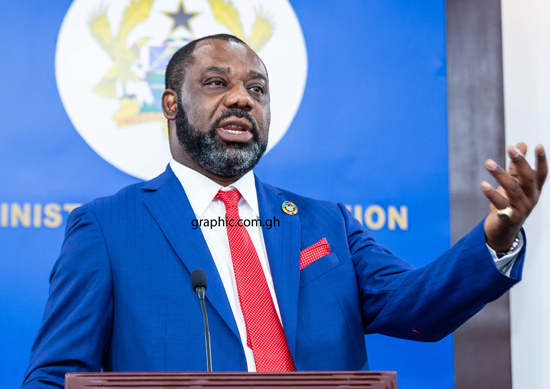
Eight laws on education passed - Chief Director says move part of legislative reform agenda
Eight out of the 21 bills developed by the Ministry of Education since 2017 have been passed into law by Parliament, while one is at the consideration stage, the Chief Director of the ministry, Mr Benjamin K. Gyasi, has announced.
Four of them cover the establishment of four public universities while the rest are the Education Regulatory Bodies' Act, the Ghana Library Service Act and the Institute of Chartered Accountants Ghana Act.
The Complementary Education Agency Bill has, however, been passed and is awaiting presidential assent, while the Pre-Tertiary Education Bill has been laid in Parliament and is at the consideration stage.
New public universities
The four new public universities established by the Act of Parliament are the S. D. Dombo University of Business and Integrated Development Studies Act 2019, Act 1001, the C. K. Tedam University of Technology and Applied Science, Navrongo Act 2019, Act 1000, the Akenten Appiah-Men Kah University of Skills Training and Entrepreneurial Development Act, 2019 Act 1026, and the Ghana Communication Technology University Act, 2020 Act 1022.
Performance
Mr Gyasi announced this at the two-day National Education Week 2020 at the Accra International Conference Centre in Accra yesterday.
Delivering a Review of the Educational Sector Performance, Mr Gyasi explained that those were part of the legislative reform agenda of the ministry in order to strengthen the legal and regulatory framework to improve the governance and efficiency of education service delivery.
2019 recommendations
Recapping the National Education Week 2019, which was held on the theme: Reforming the education sector for effective service delivery: Embracing innovation”, he made a presentation, which provided update on status of work done on each recommendation over the past year.
Mr Gyasi stated that a review of the 2019 recommendations indicated steady progress, particularly, in the development of the accountability framework and early childhood education policy while others were in the process of being developed.
Leapfrogging
In a statement, the Deputy Minister in charge of General Education, Dr Yaw Osei Adutwum, said Ghana needed to leapfrog in order to meet the challenges of the time.
He described interventions such as the Free SHS and the introduction of the Double Track System as some of the innovative leapfrogging that the government had adopted in order to address the challenges.
TVET
For her part, the Deputy Minister in charge of TVET, Mrs Gifty Twum Ampofo, said TVET provided the desirable talents, skills and the needed manpower that was required to propel development.
She commended the government for prioritising TVET as the surest way of promoting industrialisation, adding that for the first time in the history of the country, the ministry had organised a TVET Expo and intended to make it an annual affair.
Education reforms
The Minister of State in charge of Tertiary Education, Professor Kwesi Yankah, observed that since the finalisation of the education sector plan 2018-2030, extensive work had been undertaken to transform teacher education, teacher deployment, teacher standards, teacher licensing and career progression.
“The ministry’s programmes to improve educational outcomes have therefore been teacher-centred, compelling the rollout of comprehensive teacher reforms that impact every sector of education from basic through tertiary,” he announced.
